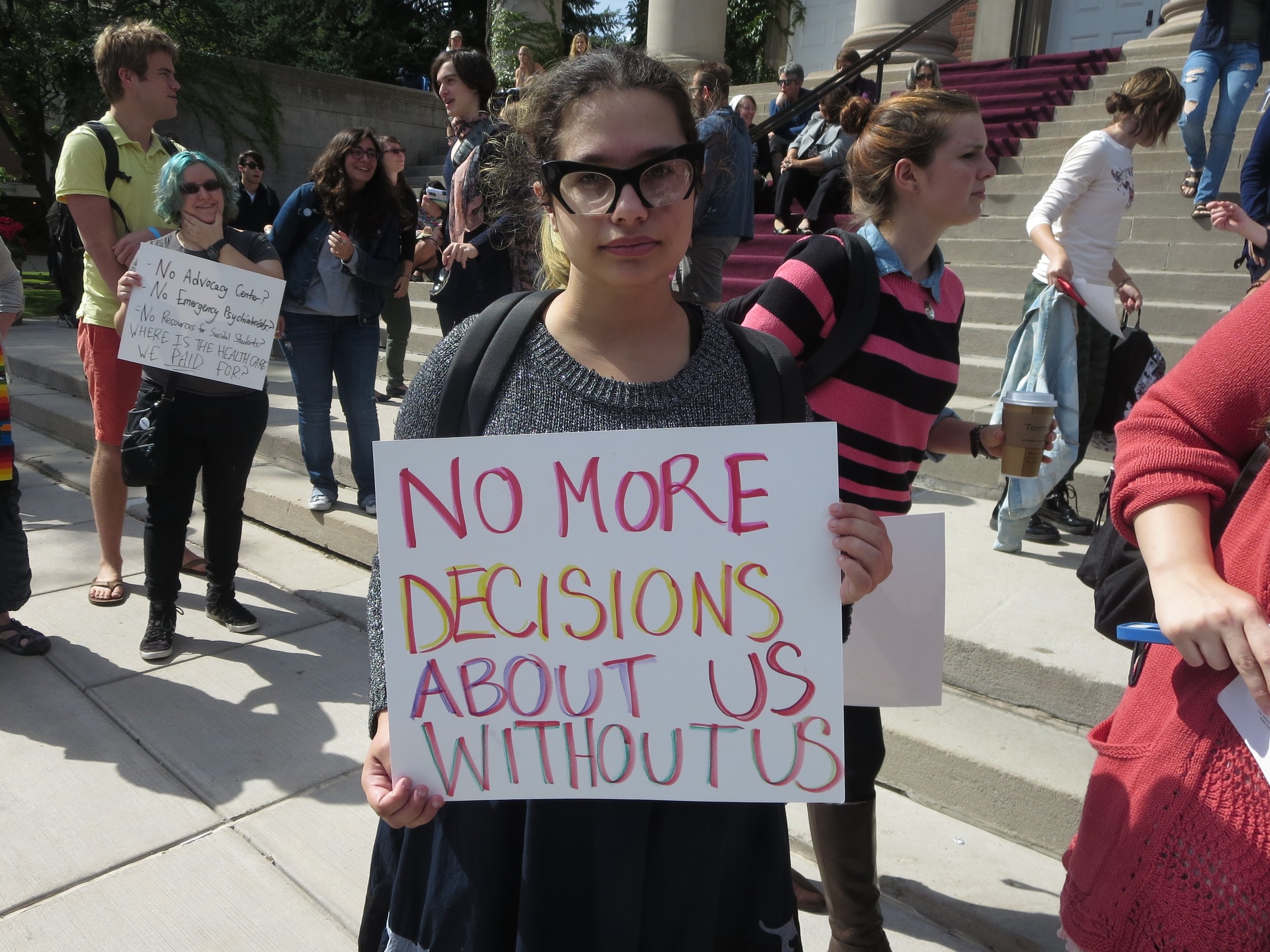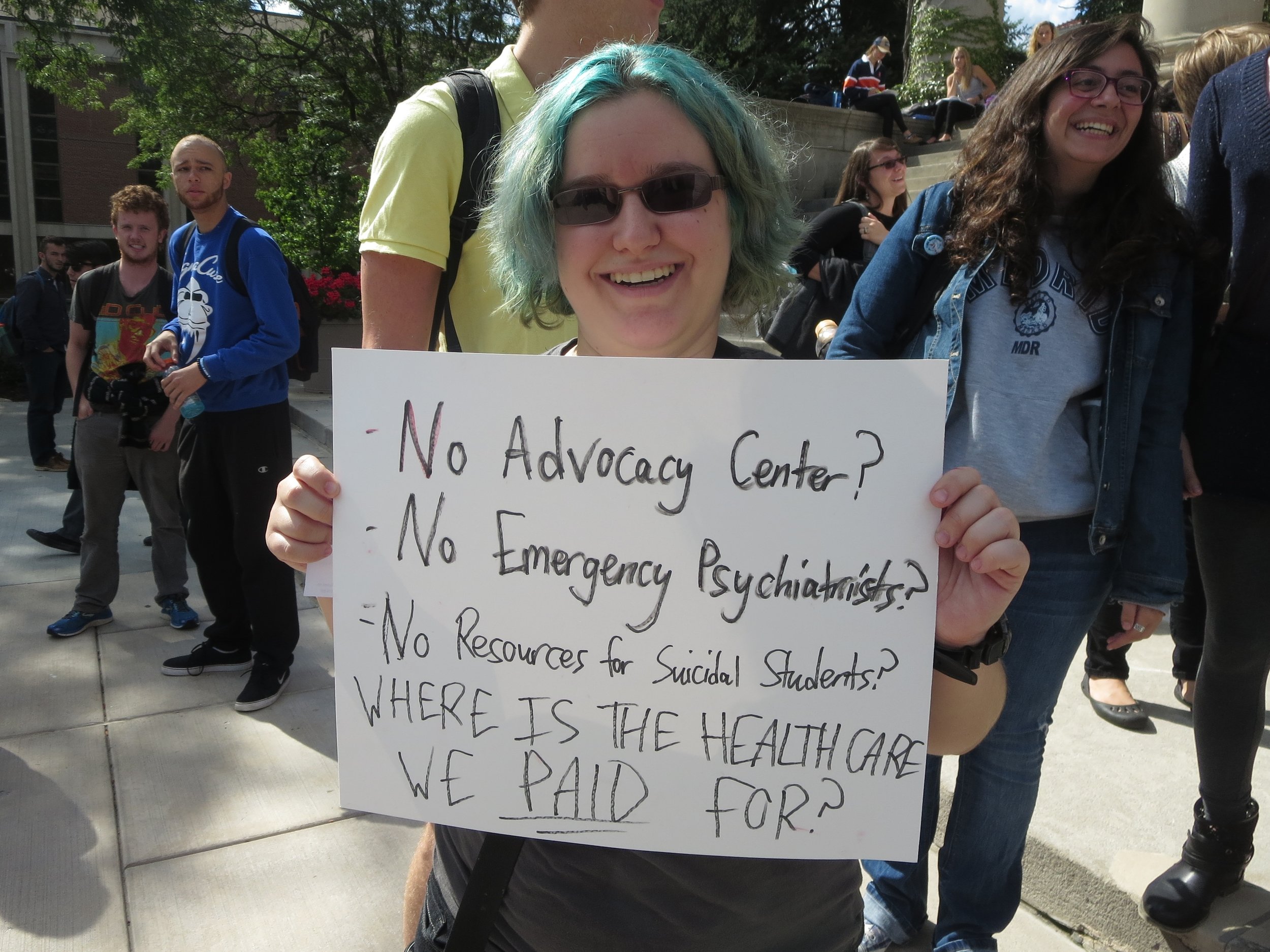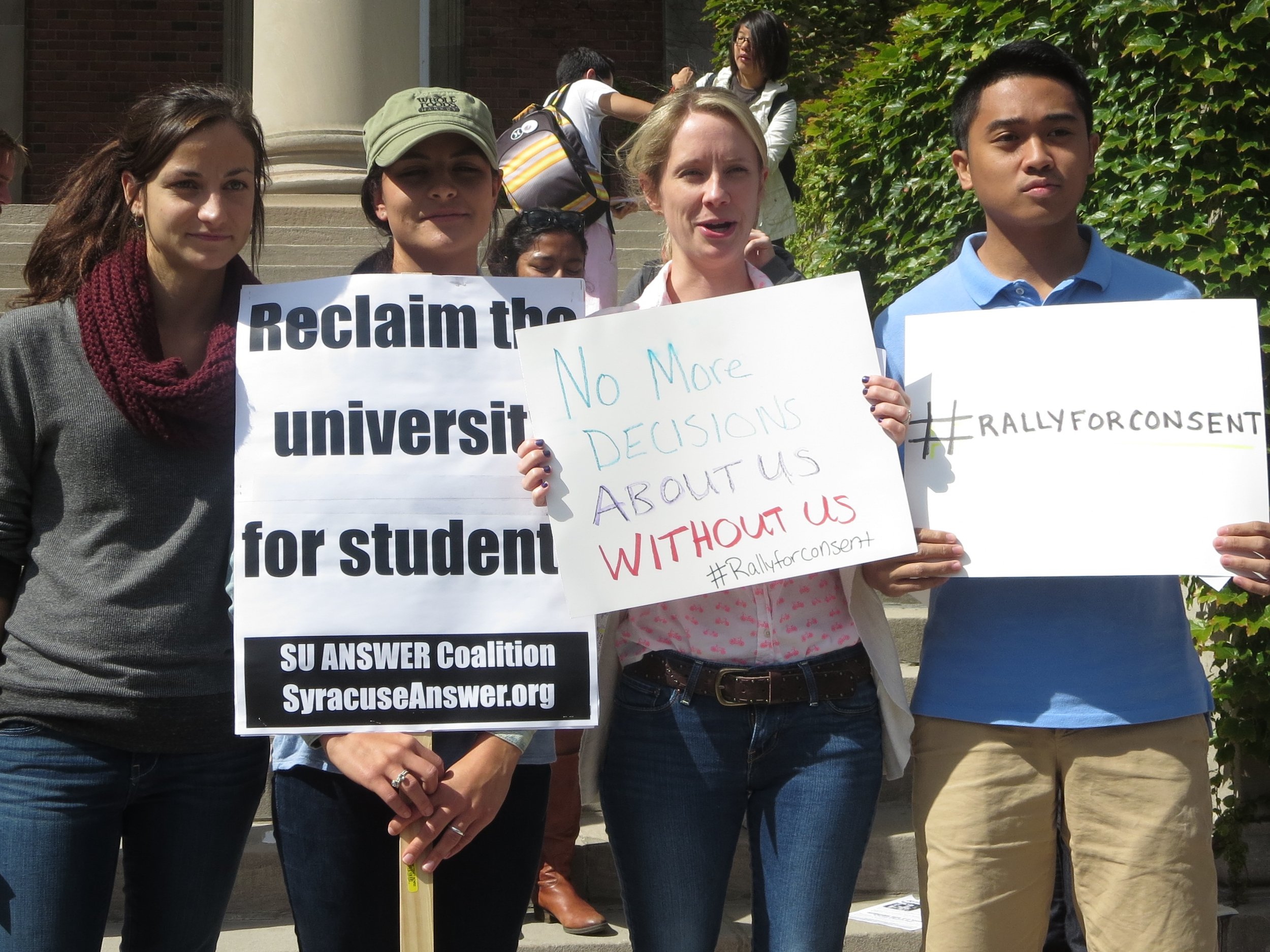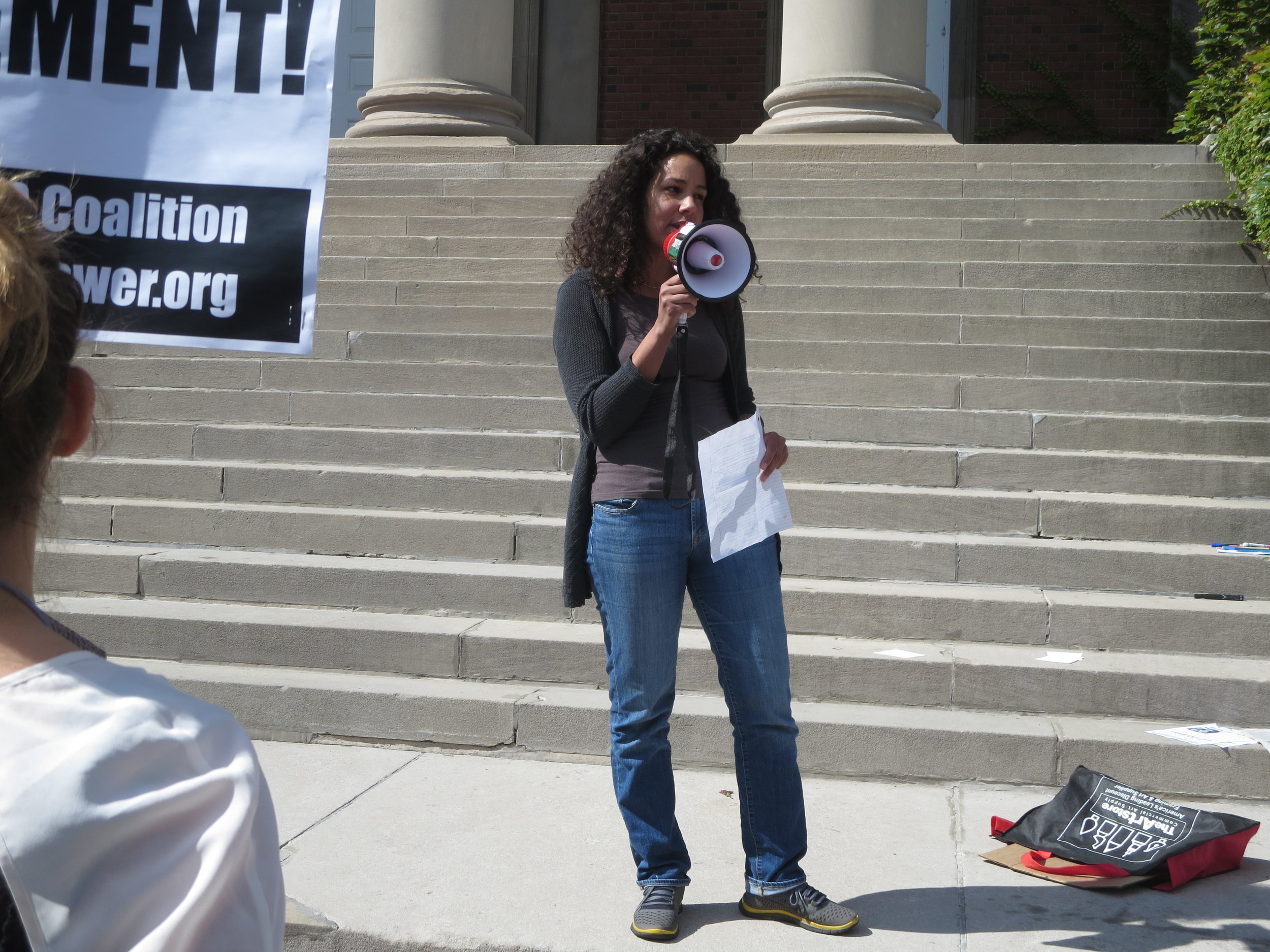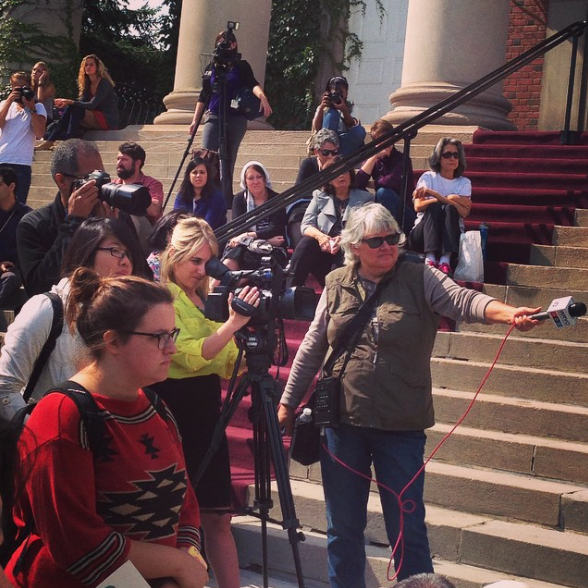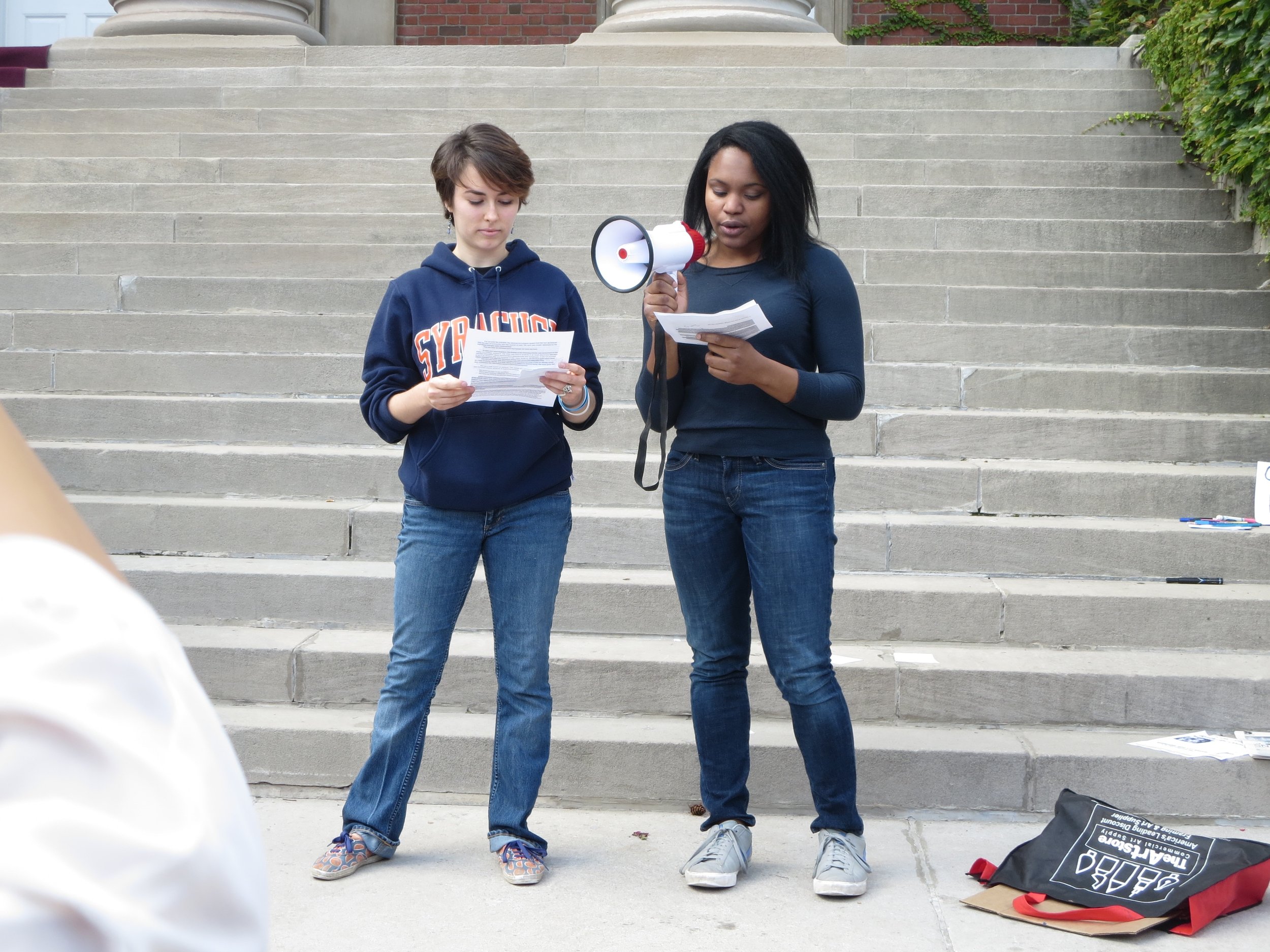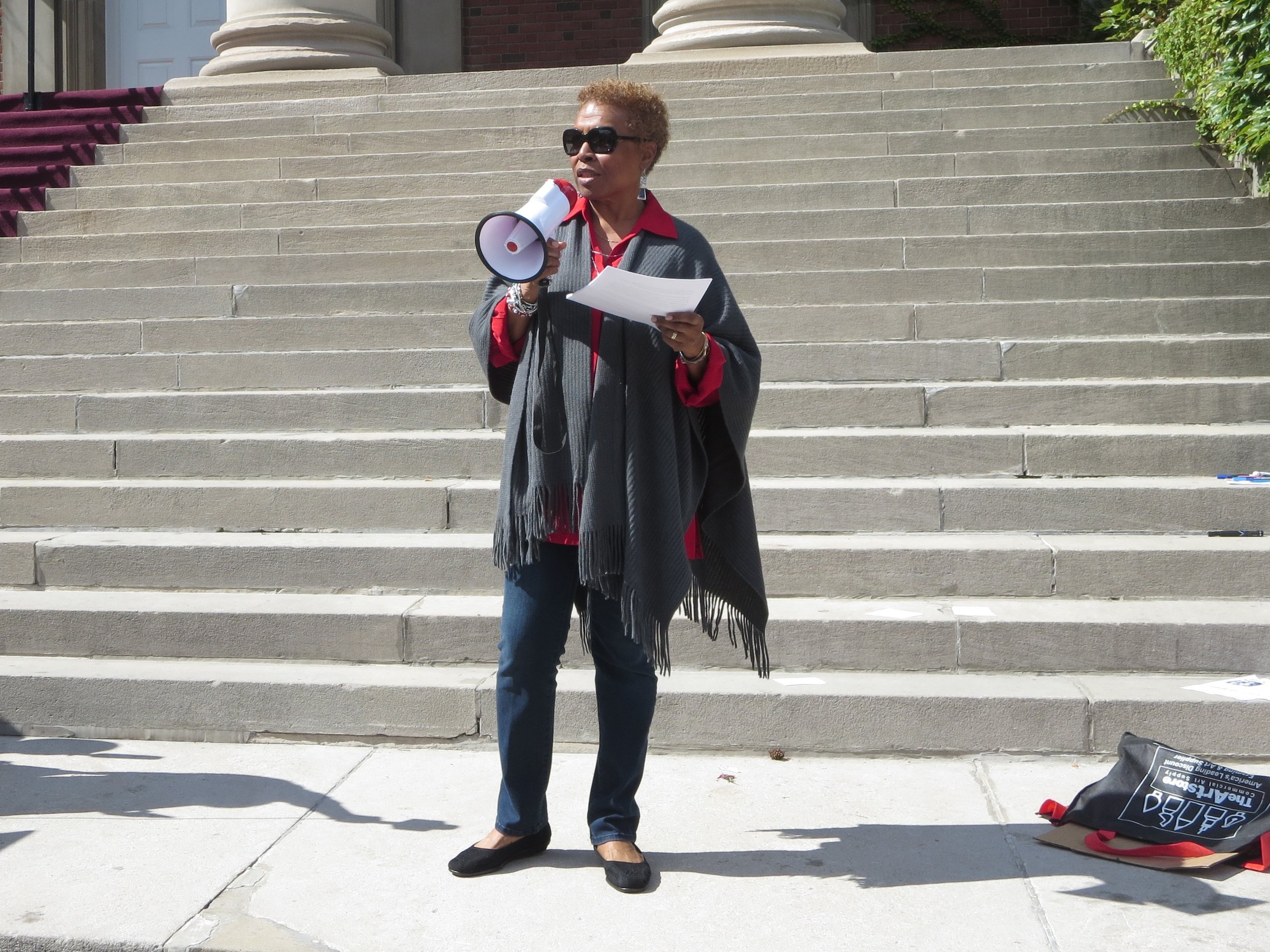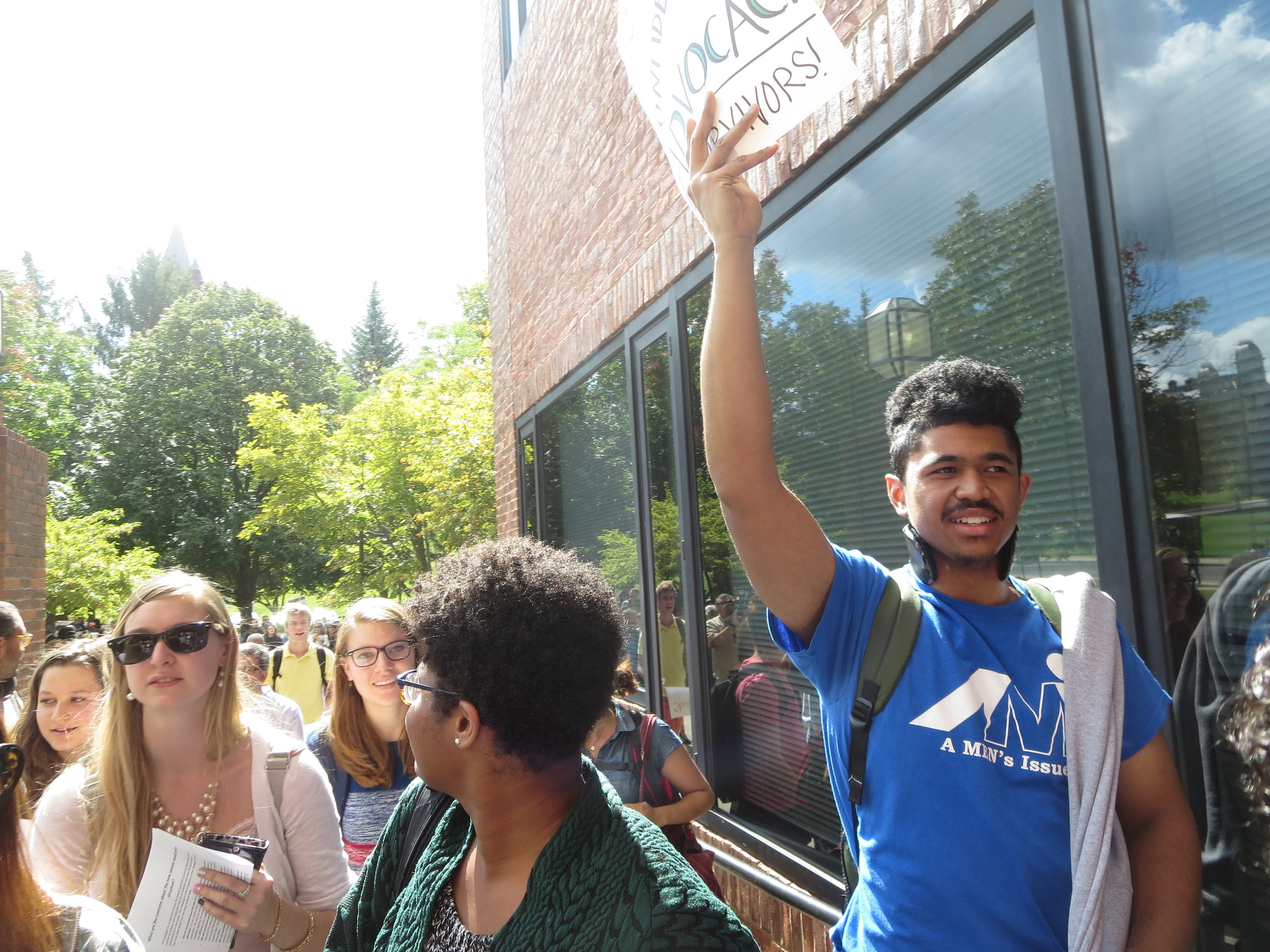Everything That Happened at the #Rally4Consent
 Syracuse University students held a Rally for Consent Wednesday in response to the administration's closing of the Advocacy Center. I participated as a supporter for the cause. Here's my personal account of what happened.
Syracuse University students held a Rally for Consent Wednesday in response to the administration's closing of the Advocacy Center. I participated as a supporter for the cause. Here's my personal account of what happened.
Background: The closure of the Advocacy Center happened without student or faculty input and at a time when most students were off campus since it was the summer. The administration only gave five days notice to the AC and the campus community. The center was a central location with all resources devoted to sexual assault prevention education and survivor support in one place. Now, students must turn to the Counseling Center, as well as other "entry points" when seeking support. Student advocates began the Campaign for an Advocacy Center to work toward a better solution — check out the letter in the Daily Orange for more details.
12 pm: Syracuse University students, faculty, staff, and community members gather at the bottom of the steps of Hendricks Chapel. There are a lot of enthusiastic signs.
12:02 pm: Organizers pass out sheets with chants.
12:08: Yanira Rodriguez, a PhD student in the Composition and Cultural Rhetoric program, who is MC-ing the rally, begins speaking with a megaphone. She acknowledges everyone involved in the campaign, and then points out the services that students can go to right now if they are a survivor of sexual assault. Shutting down the Advocacy Center has led to a lot of confusion as to where students can actually go for help.
12:10 pm: Rodriguez asks the crowd to think about why they are all here. “Hold onto the feelings that brought you here,” she says. “The culture of rape depends on our silence and amnesia.” She adds that students shouldn't feel alone, and if it’s not their voice speaking, it can be the collective voice of all of us advocating together. There is a good amount of press filming the rally.
12:11 pm: Rodriguez goes over what exactly happened with the Advocacy Center and adds that the new configuration is not what SU needs.
12:14 pm: Rodriguez speaks about why she personally is at the rally. She is here for her child who will soon head off to college. She is also here for the one in five women who will be a survivor of rape or attempted sexual assault. She is here to end rape culture.
12:15 pm: Next up is Eileen Schell, an associate professor of Writing and Rhetoric and a member on the University Senate Committee on Women’s Concerns. She says she has been at the university for 18 years. "I've always been pretty proud of Syracuse University, but this is a moment where I don't feel proud,” she says.
12:17 pm: More words from Schell: “We have a community of survivors and supporters, active advocates, and empowered bystanders. We will not stand for a culture of sexual assault. We won't stand for administration that won't allow us to speak out.” The crowd cheers in support.
12:18 pm: Schell speaks on how there was no student consolation or data collection before making this decision. She just doesn’t understand why this is happening. Everyone applauds in agreement.
12:19 pm: Next up on the steps is Farrell Greenwald Brenner, a sophomore majoring in a Citizenship and Civic Engagement and Women’s and Gender Studies. Also on the steps is Brittany Moore, a senior majoring in Information Management and Television, Radio, and Film. They lead the crowd in chant: “Whose streets? Our streets! Whose quad? Our quad! Whose school? Our school! Whose consent? Everybody’s consent!”
12:20 pm: Brenner and Moore talk more about how the students, who are affected by these decisions, should get to take part in deciding them.
12:21 pm: Moore, who is is also the Director of Technology of the Student Association, discusses how there was not a campus climate survey about the services provided before the Center was closed. "As a member of the Student Association, the defender of students, we could not make a change that would affect 14,000 without a survey,” she says.
12:22 pm: Brenner talks about how students were deeply distressed by the way changes were made, as "we were not here.” The decision regarding the closing of the Advocacy Center was announced via email on the Friday of holiday weekend. "We lost a safe space on campus,” she says. "We were not here to say goodbye. There were listening meetings but we were not here to ask questions. We were not here to provide peers with support."
12:23 pm: Moore asks, “How many students fell through cracks during these changes?” With the changes made to the Advocacy Center, some students may have been confused and not received the support they needed. She also adds that there is an even bigger issue at hand, saying “We have to work together to end the systemic rape culture on campus."
12:24 pm: Brenner reminds the crowd that their voices are important, and that enacting efficient and comprehensive sexual assault services will always important — now, and years from now.
12:25 pm: Linda Carty, an associate professor of African American Studies, is next on the steps. She is met with applause before she even speaks.
12:26 pm: Carty reads off numerous stats regarding sexual assault — the first is that one in four college women report surviving rape or attempted rape. She says that the majority of victims and defenders of sexual assault are college-aged. She adds that 42 percent of college women are raped and tell no one about it. There are more, but I realize it's hard to live-tweet, take photos, and take notes at the same time.
12:27 pm: Carty says we must empower women, which can only happen at an advocacy center — not at a rape crisis center. She leads the crowd in chant.
12:31 pm: Derek Ford, a graduate student in Cultural Foundations of Education, speaks next. He talks about dismantling systems of domination and exploitation and the importance of enacting a student movement.
12:37 pm: Kuebrich announces we will now walk to the chancellor’s office at Crouse-Hinds to read off comments from the petition (that now has over 8,000 signatures). He says we will then go inside and present him with the petition. The crowd seems really excited about this.
12:40 pm: We march toward the building, chanting along the way. It's a very empowering feeling. There must be around 200 of us, but that's just my estimate.
12:50 pm: We form two groups — one will stay outside and continue to chant, while the other will go up to the sixth floor, where the chancellor's office is, to present him with the petition. I choose to go inside the building.
12:53 pm: About 50 of us congregate in the general hallway area on the sixth floor of Crouse Hinds. It's a lot of us packed into a tight space, after climbing six flights of stairs, and I begin to sweat profusely.
12:55 pm: We are finally addressed by Senior Vice President and Dean of Student Affairs Rebecca Reed Kantrowitz and Senior Vice President of Public Affairs Kevin Quinn. Kantrowitz tell us the chancellor is not available to meet and that she did not realizing we were coming (surprise!) The group isn't taking no for an answer — after all, no one gave us advanced notice when the Advocacy Center was shut down.
12:57 pm: Quinn says that the chancellor is committed to meeting with representatives of our group, but a student says that he has not come to any of the listening meetings thus far. Another student says that if the chancellor doesn't come out, it means this is not a priority for him, and that is wrong. A woman says, "I'm a survivor of rape. I know how important this is." Someone says, "We want to see him now." Another says, "The trust has been broken, and this would be one way to establish trust." Someone else says, "He could make a big step forward if he could just come and accept the petition."
12:58 pm: Quinn finally agrees to ask the chancellor to come out, but suggests we move to the seventh floor. The group, however, brings up that it would be a lot more trouble to move 50 people than to move one person. "We're here, we're united, we don't want to divide as a group," a supporter responds. Another says, "We already fit right here." They tell us it's a conference room and the group replies that we aren't asking for a conference — we just want to present him with our petition and viewpoints.
1:05 pm: Assistant Chancellor and Chief of Staff Hoang-Anh L. Tran comes out of the chancellor's office. At this point it is really hot and I am running out of battery on all my electronics, so this part was a blur to me, but she does add that we will get to meet with the chancellor. I am so proud of everyone involved in the campaign right now.
1:10 pm: Chancellor Kent Syverud comes out of his office. It is both exciting, uncomfortable, and a little intimidating to be ten feet away from someone with so much power about an issue I care about so deeply. Some members of the campaign spoke and the chancellor responded — at this point I have lost the energy to continue taking notes, so here is a video of the whole exchange:
1:20 pm: Kantrowitz says some closing words, including that the administration is not able to, nor interested, in going back to the previous structure that was in place before.
1:21 pm: The group debriefs. A student — who identified herself as a rape survivor — says, "I love this school. But I am disappointed in the chancellor and administration." The group applauds. Another students adds that the chancellor sends us various emails, once even apologizing about something having to do with parking passes. But he has yet to apologize about the closing of the Advocacy Center or the way it was done.
1:22 pm: Someone in the group gives Kantrowitz one of the signs from the rally to hold onto — the one that says, "No more decisions about us, without us."
1:23 pm: We begin to file out, but first I ask a woman, perhaps about 50 or 60 years old, what brought her here. I didn't recognize her as a student or staff member. She told me that she was raped as a college student, dropped out, didn't tell anyone about it for years, and was never able to return to finish her degree. No matter how many times she tried, whenever she stepped foot on a college campus, it just brought back too much pain. As I listened to her story, I realized my answer to Rogriguez's question posed early in the day: this is why I'm rallying. Because survivors of sexual assault deserve to have a safe place and a support system on a college campus. And I'll continue to fight, as will my dedicated peers, until we have that place.


